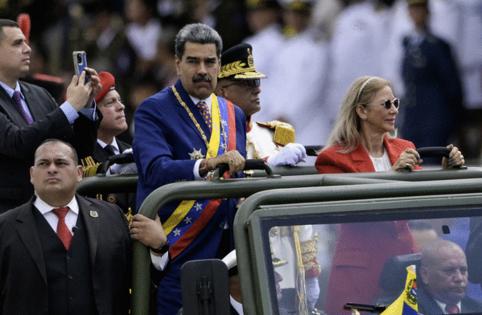From jets to Florida luxury homes: US seized a fortune from Maduro
Published in News & Features
The more than $700 million in assets the United States says it has confiscated from Venezuelan ruler Nicolás Maduro includes multiple luxury properties in Florida, Attorney General Pam Bondi said Wednesday.
Bondi’s remarks to Spanish language outlet Fox Noticias followed Friday’s announcement that the U.S. had doubled the bounty for the Venezuelan strongman to a record-setting $50 million for any information leading to his capture. At the time, she described Maduro as one of the world’s top drug kingpins and said his trafficking organization poses a direct threat to the United States.
Bondi said the United States has already seized a number of high-value assets linked to Maduro.
“These assets include two multimillion-dollar jets, multiple homes, a mansion in the Dominican Republic, several million-dollar homes in Florida, a horse farm, nine vehicles, luxury cars, and millions of dollars in jewelry and cash,” she said. “Yet his reign of terror continues... and his organized crime operation continues to function.”
Bondi did not provide details about the specific locations of the Florida properties.
In the interview, she described Maduro’s network as an organized crime operation, “no different than the mafia,” claiming that it is deeply embedded within the Venezuelan military and closely tied to some of the most violent criminal groups in the hemisphere.
In announcing the new bounty last week, Bondi said Maduro leads the Cartel of the Suns, a powerful narcotics organization that operates within Venezuela’s armed forces while ruling the country and maintaining partnerships with the nation’s notorious Tren de Aragua gang, Mexico’s Sinaloa Cartel and other international syndicates.
“He is one of the world’s biggest drug traffickers and a threat to our national security,” Bondi said. “That’s why we’ve doubled his bounty to $50 million.”
A federal indictment in New York traces Maduro’s rise inside the Cartel of the Suns. Prosecutors say that after the 2013 death of Hugo Chávez, Maduro evolved from a facilitator into the cartel’s top leader, merging its operations with the Venezuelan state to shield it from prosecution.
Court documents also claim the cartel’s objective went beyond profit, accusing it of seeking to “flood the United States with cocaine” as a means of causing social harm. Intelligence reports estimate that at least 250 tons of cocaine transited through Venezuela annually as of five years ago, but the volume has possibly doubled since to compensate for the collapse of oil income caused by U.S. sanctions.
Bondi emphasized that despite the massive asset seizures, Maduro’s organization continues to traffic narcotics on a global scale, using state infrastructure to protect and expand its reach. “We will not stop until he is brought to justice,” she said.
The $50 million reward—available to anyone worldwide who can provide actionable intelligence leading to Maduro’s arrest and extradition—is the highest ever offered by the United States for a sitting head of state. It surpasses the $25 million previously offered for Maduro and eclipses past bounties placed on figures such as former Panamanian leader Manuel Noriega and Mexican drug lord Joaquín “El Chapo” Guzmán.
_____
©2025 Miami Herald. Visit miamiherald.com. Distributed by Tribune Content Agency, LLC.







Comments